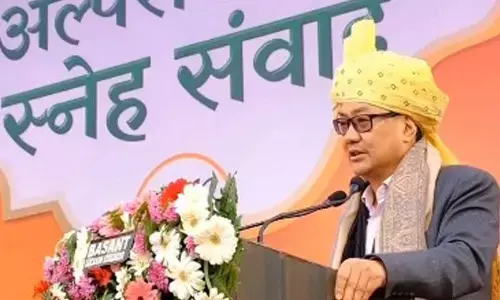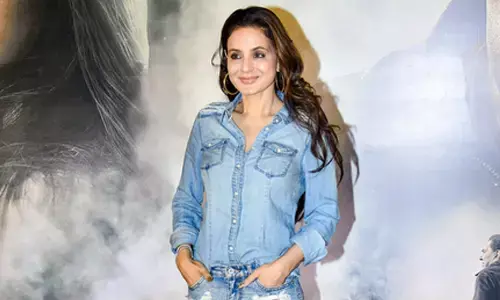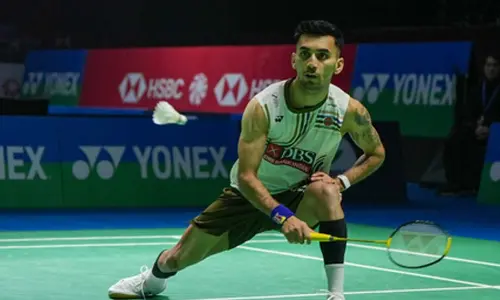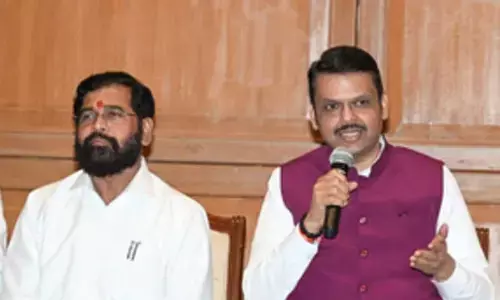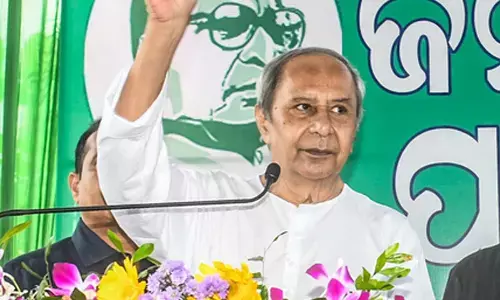Mythopoeia or Manipulation

Barbareekudu, the theatrical adaptation of the Souda's short story by the same name, fails to show much respect for either mythology or history, unlike the original leaving much to be desired  Sauda Aruna Theatre Group's mythico-historical play 'Barbareekudu', is a theatrical adaptation of the Souda's short story by the same name and was performed recently in Ravindra Bharati, Hyderabad. In original epic Mahabharata, Barbarikudu is the son Ghatatakocha, who is the son of Bhima with Hidimbi. Acclaimed to be the greatest fighter of the contemporary world, Barbarika desired (as directed by his mother) to fight Kurukshetra battle, to be fought between Kauravas and Pandavas. But, he is beheaded by Krishna as an oblation, a sacred sacrifice for the great battle, which is on the verge. His chopped head is bestowed with a boon of watching the entire Kurukshetra battle atop a hill. In his adaptation, Souda portrayed the character of 'Barbarikudu' inverted from the beaten path, while subtracting the apparent connotations of mystics. So, the rendition elevates from social to psychological planes, i.e. from outward to inward. The structure of feelings is absolutely different in the sources from the Mahabharata. Inversion of popular myths is not new to Telugu literature or other art forms. Tripuraneni Ramaswamy Chowdary, Narla Venkateswara Rao made a fierce attack on the epics and mythology. With an anti-Brahminical outlook, they mocked, reinterpreted the religious texts, myths and ancient classics; and thoroughly exposed the bias of those 'dogmas' and the discrimination to which the sudras, the people of lower strata in the caste-order were subjected to. In their inverted narration, they opposed the 'original' version, as if it was of the victors and retold from a victims' point of view. The established images of the so-called golden eras were savagely destroyed and the roles of heroes and villains were swapped. Nevertheless, there was absolutely no attack on the established values. Brahminical values were attributed to villains like Ravana, Duryodhana and Karna, even with conceit. In his pioneering attempt, Souda made a strong attack on the 'values', which according to him are conspiracies by themselves. Since the morals of the epic idols, mythological heroes promoted a rigid value system that legitimised inequality in the hierarchical Indian society, Souda targeted a severe assault in the cultural front on status-quo of those values, in order to build an egalitarian social succession, shorn of disparities. Therefore, according to Souda, any exalted value- dhatrutva (charity), dharma (obligation), satya (truthfulness) - is not monolithic and also not unilateral, as defined and determined by Brahminical hierarchy. Through the character of Lord Krishna, Souda is so verbal and explicit on his stance. Accordingly, he asserts that the aboriginal groups have their own obligation of fighting for their own sake, not fighting on behalf of someone else. But, the indigenous people- the majority, should not bind themselves in an abject servitude by oral vows. Souda heckles the 'irrevocability' of the oaths, and warns that those promises are not only self-ruinous to the pledged, but also disastrous to the entire clan. But, shackled by the conservative values, Barbarikudu, only ray of hope to the majority milieu of mulavasis, falls prey to his own pledge and obviously plays into the hands of caste-Hindus. In an attempt to get the voice of the Dalits, suppressed for ages, heard robustly, Souda aggressively made the conventions blow apart and images cave in. However, the iconoclastic genius showed in his own work of literature was missing in this performing genre. Souda, being a misfit in the director's shoes, was in haste to convince the audience with the impending changes in the tone and its objectivity, and perhaps turned rhetoric. In his Apurva Purana kathalu (Unprecedented mythical stories: a left-hand mythology), in which Barbarikudu is one of the stories, Souda deals with plethora of compartmentalised themes of modern and post modern debate, including mysticism, spirituality, ethnicity, casteism and feminism. It is really unprecedented in the new genre of 'Perspective Writing' in Telugu literature. Understanding the epics between the lines and expanding his new text from the pregnant silences left in the originals, Souda created a new classic with lyrical charm and idiom. In that inverted myth, he did not bid adieu to the original motif and moreover, elevated some important characters, like Sri Krishna, to a level of a highly responsive and agile planes, with more mystic touch of poises and poetics. But, as the playwright, Souda did not show much respect for either mythology or history, but, of course has a rich knowledge of their intricacies to prove his point. He blatantly changed story, and tailored it to suit his agenda of propaganda. Souda's stripped-down, in-your-face direction suffers from over-exposition and sheer explicit sans art. A tormented soul like Souda is definitely at unease in a hostile world of inequalities and obviously provoked by a rage yearning for revenge. But, being a refined artist, his fight against communal demons in the minds of the people must be on cultural front, but not confined to political plane. Since Souda tried to manipulate the art diminishing it to a level of propaganda, with whatsoever motive, the brilliance of the performances of the artiste, particularly the protagonist Barbarikudu (Kumar Teja) and Sri Krishna (Tiruveer); might go in vain and thus, the play remains deceptive. If, Souda had chosen the proscenium theatre, a befitting way to perform such provocative themes, rather than performing the play in elitist venues away from the targeted Dalit masses, it would have been better.
Sauda Aruna Theatre Group's mythico-historical play 'Barbareekudu', is a theatrical adaptation of the Souda's short story by the same name and was performed recently in Ravindra Bharati, Hyderabad. In original epic Mahabharata, Barbarikudu is the son Ghatatakocha, who is the son of Bhima with Hidimbi. Acclaimed to be the greatest fighter of the contemporary world, Barbarika desired (as directed by his mother) to fight Kurukshetra battle, to be fought between Kauravas and Pandavas. But, he is beheaded by Krishna as an oblation, a sacred sacrifice for the great battle, which is on the verge. His chopped head is bestowed with a boon of watching the entire Kurukshetra battle atop a hill. In his adaptation, Souda portrayed the character of 'Barbarikudu' inverted from the beaten path, while subtracting the apparent connotations of mystics. So, the rendition elevates from social to psychological planes, i.e. from outward to inward. The structure of feelings is absolutely different in the sources from the Mahabharata. Inversion of popular myths is not new to Telugu literature or other art forms. Tripuraneni Ramaswamy Chowdary, Narla Venkateswara Rao made a fierce attack on the epics and mythology. With an anti-Brahminical outlook, they mocked, reinterpreted the religious texts, myths and ancient classics; and thoroughly exposed the bias of those 'dogmas' and the discrimination to which the sudras, the people of lower strata in the caste-order were subjected to. In their inverted narration, they opposed the 'original' version, as if it was of the victors and retold from a victims' point of view. The established images of the so-called golden eras were savagely destroyed and the roles of heroes and villains were swapped. Nevertheless, there was absolutely no attack on the established values. Brahminical values were attributed to villains like Ravana, Duryodhana and Karna, even with conceit. In his pioneering attempt, Souda made a strong attack on the 'values', which according to him are conspiracies by themselves. Since the morals of the epic idols, mythological heroes promoted a rigid value system that legitimised inequality in the hierarchical Indian society, Souda targeted a severe assault in the cultural front on status-quo of those values, in order to build an egalitarian social succession, shorn of disparities. Therefore, according to Souda, any exalted value- dhatrutva (charity), dharma (obligation), satya (truthfulness) - is not monolithic and also not unilateral, as defined and determined by Brahminical hierarchy. Through the character of Lord Krishna, Souda is so verbal and explicit on his stance. Accordingly, he asserts that the aboriginal groups have their own obligation of fighting for their own sake, not fighting on behalf of someone else. But, the indigenous people- the majority, should not bind themselves in an abject servitude by oral vows. Souda heckles the 'irrevocability' of the oaths, and warns that those promises are not only self-ruinous to the pledged, but also disastrous to the entire clan. But, shackled by the conservative values, Barbarikudu, only ray of hope to the majority milieu of mulavasis, falls prey to his own pledge and obviously plays into the hands of caste-Hindus. In an attempt to get the voice of the Dalits, suppressed for ages, heard robustly, Souda aggressively made the conventions blow apart and images cave in. However, the iconoclastic genius showed in his own work of literature was missing in this performing genre. Souda, being a misfit in the director's shoes, was in haste to convince the audience with the impending changes in the tone and its objectivity, and perhaps turned rhetoric. In his Apurva Purana kathalu (Unprecedented mythical stories: a left-hand mythology), in which Barbarikudu is one of the stories, Souda deals with plethora of compartmentalised themes of modern and post modern debate, including mysticism, spirituality, ethnicity, casteism and feminism. It is really unprecedented in the new genre of 'Perspective Writing' in Telugu literature. Understanding the epics between the lines and expanding his new text from the pregnant silences left in the originals, Souda created a new classic with lyrical charm and idiom. In that inverted myth, he did not bid adieu to the original motif and moreover, elevated some important characters, like Sri Krishna, to a level of a highly responsive and agile planes, with more mystic touch of poises and poetics. But, as the playwright, Souda did not show much respect for either mythology or history, but, of course has a rich knowledge of their intricacies to prove his point. He blatantly changed story, and tailored it to suit his agenda of propaganda. Souda's stripped-down, in-your-face direction suffers from over-exposition and sheer explicit sans art. A tormented soul like Souda is definitely at unease in a hostile world of inequalities and obviously provoked by a rage yearning for revenge. But, being a refined artist, his fight against communal demons in the minds of the people must be on cultural front, but not confined to political plane. Since Souda tried to manipulate the art diminishing it to a level of propaganda, with whatsoever motive, the brilliance of the performances of the artiste, particularly the protagonist Barbarikudu (Kumar Teja) and Sri Krishna (Tiruveer); might go in vain and thus, the play remains deceptive. If, Souda had chosen the proscenium theatre, a befitting way to perform such provocative themes, rather than performing the play in elitist venues away from the targeted Dalit masses, it would have been better.
 Sauda Aruna Theatre Group's mythico-historical play 'Barbareekudu', is a theatrical adaptation of the Souda's short story by the same name and was performed recently in Ravindra Bharati, Hyderabad. In original epic Mahabharata, Barbarikudu is the son Ghatatakocha, who is the son of Bhima with Hidimbi. Acclaimed to be the greatest fighter of the contemporary world, Barbarika desired (as directed by his mother) to fight Kurukshetra battle, to be fought between Kauravas and Pandavas. But, he is beheaded by Krishna as an oblation, a sacred sacrifice for the great battle, which is on the verge. His chopped head is bestowed with a boon of watching the entire Kurukshetra battle atop a hill. In his adaptation, Souda portrayed the character of 'Barbarikudu' inverted from the beaten path, while subtracting the apparent connotations of mystics. So, the rendition elevates from social to psychological planes, i.e. from outward to inward. The structure of feelings is absolutely different in the sources from the Mahabharata. Inversion of popular myths is not new to Telugu literature or other art forms. Tripuraneni Ramaswamy Chowdary, Narla Venkateswara Rao made a fierce attack on the epics and mythology. With an anti-Brahminical outlook, they mocked, reinterpreted the religious texts, myths and ancient classics; and thoroughly exposed the bias of those 'dogmas' and the discrimination to which the sudras, the people of lower strata in the caste-order were subjected to. In their inverted narration, they opposed the 'original' version, as if it was of the victors and retold from a victims' point of view. The established images of the so-called golden eras were savagely destroyed and the roles of heroes and villains were swapped. Nevertheless, there was absolutely no attack on the established values. Brahminical values were attributed to villains like Ravana, Duryodhana and Karna, even with conceit. In his pioneering attempt, Souda made a strong attack on the 'values', which according to him are conspiracies by themselves. Since the morals of the epic idols, mythological heroes promoted a rigid value system that legitimised inequality in the hierarchical Indian society, Souda targeted a severe assault in the cultural front on status-quo of those values, in order to build an egalitarian social succession, shorn of disparities. Therefore, according to Souda, any exalted value- dhatrutva (charity), dharma (obligation), satya (truthfulness) - is not monolithic and also not unilateral, as defined and determined by Brahminical hierarchy. Through the character of Lord Krishna, Souda is so verbal and explicit on his stance. Accordingly, he asserts that the aboriginal groups have their own obligation of fighting for their own sake, not fighting on behalf of someone else. But, the indigenous people- the majority, should not bind themselves in an abject servitude by oral vows. Souda heckles the 'irrevocability' of the oaths, and warns that those promises are not only self-ruinous to the pledged, but also disastrous to the entire clan. But, shackled by the conservative values, Barbarikudu, only ray of hope to the majority milieu of mulavasis, falls prey to his own pledge and obviously plays into the hands of caste-Hindus. In an attempt to get the voice of the Dalits, suppressed for ages, heard robustly, Souda aggressively made the conventions blow apart and images cave in. However, the iconoclastic genius showed in his own work of literature was missing in this performing genre. Souda, being a misfit in the director's shoes, was in haste to convince the audience with the impending changes in the tone and its objectivity, and perhaps turned rhetoric. In his Apurva Purana kathalu (Unprecedented mythical stories: a left-hand mythology), in which Barbarikudu is one of the stories, Souda deals with plethora of compartmentalised themes of modern and post modern debate, including mysticism, spirituality, ethnicity, casteism and feminism. It is really unprecedented in the new genre of 'Perspective Writing' in Telugu literature. Understanding the epics between the lines and expanding his new text from the pregnant silences left in the originals, Souda created a new classic with lyrical charm and idiom. In that inverted myth, he did not bid adieu to the original motif and moreover, elevated some important characters, like Sri Krishna, to a level of a highly responsive and agile planes, with more mystic touch of poises and poetics. But, as the playwright, Souda did not show much respect for either mythology or history, but, of course has a rich knowledge of their intricacies to prove his point. He blatantly changed story, and tailored it to suit his agenda of propaganda. Souda's stripped-down, in-your-face direction suffers from over-exposition and sheer explicit sans art. A tormented soul like Souda is definitely at unease in a hostile world of inequalities and obviously provoked by a rage yearning for revenge. But, being a refined artist, his fight against communal demons in the minds of the people must be on cultural front, but not confined to political plane. Since Souda tried to manipulate the art diminishing it to a level of propaganda, with whatsoever motive, the brilliance of the performances of the artiste, particularly the protagonist Barbarikudu (Kumar Teja) and Sri Krishna (Tiruveer); might go in vain and thus, the play remains deceptive. If, Souda had chosen the proscenium theatre, a befitting way to perform such provocative themes, rather than performing the play in elitist venues away from the targeted Dalit masses, it would have been better.
Sauda Aruna Theatre Group's mythico-historical play 'Barbareekudu', is a theatrical adaptation of the Souda's short story by the same name and was performed recently in Ravindra Bharati, Hyderabad. In original epic Mahabharata, Barbarikudu is the son Ghatatakocha, who is the son of Bhima with Hidimbi. Acclaimed to be the greatest fighter of the contemporary world, Barbarika desired (as directed by his mother) to fight Kurukshetra battle, to be fought between Kauravas and Pandavas. But, he is beheaded by Krishna as an oblation, a sacred sacrifice for the great battle, which is on the verge. His chopped head is bestowed with a boon of watching the entire Kurukshetra battle atop a hill. In his adaptation, Souda portrayed the character of 'Barbarikudu' inverted from the beaten path, while subtracting the apparent connotations of mystics. So, the rendition elevates from social to psychological planes, i.e. from outward to inward. The structure of feelings is absolutely different in the sources from the Mahabharata. Inversion of popular myths is not new to Telugu literature or other art forms. Tripuraneni Ramaswamy Chowdary, Narla Venkateswara Rao made a fierce attack on the epics and mythology. With an anti-Brahminical outlook, they mocked, reinterpreted the religious texts, myths and ancient classics; and thoroughly exposed the bias of those 'dogmas' and the discrimination to which the sudras, the people of lower strata in the caste-order were subjected to. In their inverted narration, they opposed the 'original' version, as if it was of the victors and retold from a victims' point of view. The established images of the so-called golden eras were savagely destroyed and the roles of heroes and villains were swapped. Nevertheless, there was absolutely no attack on the established values. Brahminical values were attributed to villains like Ravana, Duryodhana and Karna, even with conceit. In his pioneering attempt, Souda made a strong attack on the 'values', which according to him are conspiracies by themselves. Since the morals of the epic idols, mythological heroes promoted a rigid value system that legitimised inequality in the hierarchical Indian society, Souda targeted a severe assault in the cultural front on status-quo of those values, in order to build an egalitarian social succession, shorn of disparities. Therefore, according to Souda, any exalted value- dhatrutva (charity), dharma (obligation), satya (truthfulness) - is not monolithic and also not unilateral, as defined and determined by Brahminical hierarchy. Through the character of Lord Krishna, Souda is so verbal and explicit on his stance. Accordingly, he asserts that the aboriginal groups have their own obligation of fighting for their own sake, not fighting on behalf of someone else. But, the indigenous people- the majority, should not bind themselves in an abject servitude by oral vows. Souda heckles the 'irrevocability' of the oaths, and warns that those promises are not only self-ruinous to the pledged, but also disastrous to the entire clan. But, shackled by the conservative values, Barbarikudu, only ray of hope to the majority milieu of mulavasis, falls prey to his own pledge and obviously plays into the hands of caste-Hindus. In an attempt to get the voice of the Dalits, suppressed for ages, heard robustly, Souda aggressively made the conventions blow apart and images cave in. However, the iconoclastic genius showed in his own work of literature was missing in this performing genre. Souda, being a misfit in the director's shoes, was in haste to convince the audience with the impending changes in the tone and its objectivity, and perhaps turned rhetoric. In his Apurva Purana kathalu (Unprecedented mythical stories: a left-hand mythology), in which Barbarikudu is one of the stories, Souda deals with plethora of compartmentalised themes of modern and post modern debate, including mysticism, spirituality, ethnicity, casteism and feminism. It is really unprecedented in the new genre of 'Perspective Writing' in Telugu literature. Understanding the epics between the lines and expanding his new text from the pregnant silences left in the originals, Souda created a new classic with lyrical charm and idiom. In that inverted myth, he did not bid adieu to the original motif and moreover, elevated some important characters, like Sri Krishna, to a level of a highly responsive and agile planes, with more mystic touch of poises and poetics. But, as the playwright, Souda did not show much respect for either mythology or history, but, of course has a rich knowledge of their intricacies to prove his point. He blatantly changed story, and tailored it to suit his agenda of propaganda. Souda's stripped-down, in-your-face direction suffers from over-exposition and sheer explicit sans art. A tormented soul like Souda is definitely at unease in a hostile world of inequalities and obviously provoked by a rage yearning for revenge. But, being a refined artist, his fight against communal demons in the minds of the people must be on cultural front, but not confined to political plane. Since Souda tried to manipulate the art diminishing it to a level of propaganda, with whatsoever motive, the brilliance of the performances of the artiste, particularly the protagonist Barbarikudu (Kumar Teja) and Sri Krishna (Tiruveer); might go in vain and thus, the play remains deceptive. If, Souda had chosen the proscenium theatre, a befitting way to perform such provocative themes, rather than performing the play in elitist venues away from the targeted Dalit masses, it would have been better.Next Story








